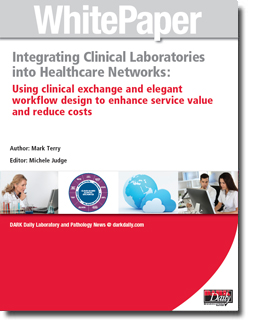This white paper has expired. Contact us for more information at info@darkreport.com
The Dark Report is pleased to offer this FREE White Paper providing you with a detailed discussion on the complexities of integrated healthcare networks, and how clinical diagnostic laboratories can utilize a clinical exchange solution to cut costs and improve workflow.
Clinical laboratories and pathology groups have a unique opportunity to deliver value to ACOs, medical homes, and other emerging models of integrated clinical care. To do so, however, requires labs to develop robust interfaces with all the various participants in today’s integrated care networks.
After all, modern healthcare delivery today is built on myriad networks:
- Hospitals to physicians
- Physicians to laboratories
- Laboratories to insurers
- Insurers to hospitals
- Physicians to insurers
- Hospitals to government (both state and federal)
- Labs and providers to Health Information Exchanges
In addition to clinical networks, there are business networks, medical records networks, patient health networks, and inpatient and outpatient networks. A major component of the Affordable Care Act was to stimulate the development of Accountable Care Organizations, which are essentially extended regional healthcare networks.
Yet connecting complex networks to each other, with their numerous and disparate technology platforms, can be expensive and time-consuming. It is important that clinical laboratories and pathology groups—which typically support their own internal networks—integrate seamlessly into the networks of whatever institution they are affiliated with, as well interfacing with numerous client networks.
This FREE White Paper specifically addresses:
- The complex network structure of today’s clinical laboratories and networked healthcare systems
- Essential components of integrated clinical laboratory operations and networks
- Challenges and complexities of integrating clinical diagnostic and pathology laboratories into those networks
- How to advance the value propositions of the fully integrated clinical laboratory
- Case study: How a major metropolitan health system laboratory utilized the Emdeon Clinical Exchange™ to integrate its automated production laboratory into a larger network in a short period of time, with minimum expense and disruption to workflow
Table of Contents
Chapter 1: Clinical Laboratories and Multiple Health Networks
Chapter 2: Understanding the Essentials of Integrated Clinical Laboratory Operations
Chapter 3: The Complexities of Clinical Laboratory Network Integration
Chapter 4: Case Study: North Memorial Hospital, Robbinsdale, MN
Chapter 5: Advancing the Value Propositions of the Fully Integrated Clinical Lab
To better understand the challenges of integrating clinical laboratories and their various networks into the wider universe of healthcare networks, and to learn how using a clinical exchange solution can overcome these challenges, help expedite successful integration into a larger healthcare network and ultimately lead to enhanced service value and ongoing cost reductions, download your FREE copy of “Integrating Clinical Laboratories into Healthcare Networks: Using clinical exchange and elegant workflow design to enhance service value and reduce costs.”



